Colman Jones:
TV, film & video work
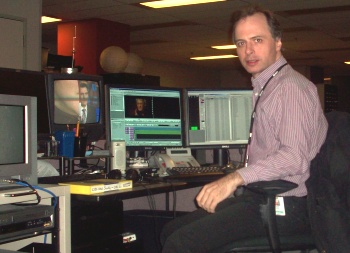 Although Colman's
main accomplishments have been in radio and print journalism, he also worked extensively at various television news and current affairs
programs at the CBC, most recently serving as an associate producer for the network's World News desk. Prior to that was a 3-year stint at CBC's flagship TV newscast The National, where he worked on a series of investigative features with veteran reporter Wendy Mesley, and maintained the program`s website during its redesign. Although Colman's
main accomplishments have been in radio and print journalism, he also worked extensively at various television news and current affairs
programs at the CBC, most recently serving as an associate producer for the network's World News desk. Prior to that was a 3-year stint at CBC's flagship TV newscast The National, where he worked on a series of investigative features with veteran reporter Wendy Mesley, and maintained the program`s website during its redesign.
This followed 5 years producing and editing segments for the former weekly two-hour newsmagazine CBC
News: Sunday,   examining everything from the business of predicting the future to the troubles currently facing the newspaper industry. His pieces have examined the hazards of cell phone obsession, excess alcohol consumption, examining everything from the business of predicting the future to the troubles currently facing the newspaper industry. His pieces have examined the hazards of cell phone obsession, excess alcohol consumption,  and posting personal information online. and posting personal information online.  He produced a profile of Swiss chemist and LSD discoverer Albert Hofmann the week he died; an item examining the ethical/medical debate over when life actually ends; a look back at 40 years of the He produced a profile of Swiss chemist and LSD discoverer Albert Hofmann the week he died; an item examining the ethical/medical debate over when life actually ends; a look back at 40 years of the  CBC CBC  Radio program As It Happens (where Colman worked for several years earlier in his career); an overview of the Canadian fringe political parties running in the 2008 federal election; a look at Google on its tenth birthday; Radio program As It Happens (where Colman worked for several years earlier in his career); an overview of the Canadian fringe political parties running in the 2008 federal election; a look at Google on its tenth birthday;  a segment about how constant interruptions from electronic devices lower IQ scores; and a segment about how constant interruptions from electronic devices lower IQ scores; and  a humorous review of amateur footage allegedly depicting the legendary creature Bigfoot. a humorous review of amateur footage allegedly depicting the legendary creature Bigfoot.
His first assigment for the Sunday program had him following Canadian actor and writer R.H. Thomson up to the  annual Couchiching conference in Northern Ontario, where Colman helped shoot and produce a contemplative video essay on Canadian identity, also composing the incidental music. annual Couchiching conference in Northern Ontario, where Colman helped shoot and produce a contemplative video essay on Canadian identity, also composing the incidental music.  He later gathered material for a weekly summary of unusual events around the world, and also organized live discussions, locating and booking live guests to talk about the marketing of fair-trade coffee, the future of economists who failed to predict the financial crisis, and a striking case of paternity fraud. He also helped film-maker David Ridgen gather
information for his award-winning documentary "Mississippi
Cold Case", He later gathered material for a weekly summary of unusual events around the world, and also organized live discussions, locating and booking live guests to talk about the marketing of fair-trade coffee, the future of economists who failed to predict the financial crisis, and a striking case of paternity fraud. He also helped film-maker David Ridgen gather
information for his award-winning documentary "Mississippi
Cold Case",  edited together
a web-exclusive collage of Canadian soldiers edited together
a web-exclusive collage of Canadian soldiers  sending Father's Day greetings from Afghanistan, and contributed a wealth of research
and online content for a special half-hour report examining challenges to the official account of 9/11. sending Father's Day greetings from Afghanistan, and contributed a wealth of research
and online content for a special half-hour report examining challenges to the official account of 9/11.
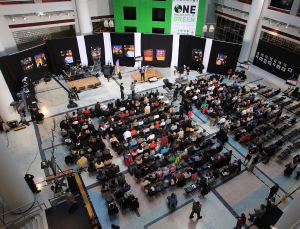 CBC News: Sunday broadcast its final morning show May 31, 2009 live from the CBC Atrium (left) - and you can watch the whole thing online, in eight parts. Colman played piano during the commercial breaks, dressed in a tux, and was briefly introduced on-air. CBC News: Sunday broadcast its final morning show May 31, 2009 live from the CBC Atrium (left) - and you can watch the whole thing online, in eight parts. Colman played piano during the commercial breaks, dressed in a tux, and was briefly introduced on-air.
He then moved on to work on the website for The National, taking over regular website maintenance during the design and preparation of the show's new online presence, posting video segments, assembling additional online content, moderating viewer comments, and promoting the program on the internet, including via social networks. It was in the summer of 201 that he began working on the network's World News desk, helping assemble reports for both the network's news syndication service and the National.
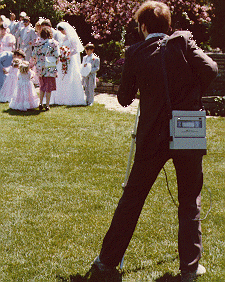 Colman
has been working with visual media, in one form or another, ever since
he started playing around with the family Super 8 camera at the age
of 12, editing together home movies with using a simple film splicer,
and creating soundtracks with music, sound effects and voice-overs.
This later developed into an interest in home video, with Colman acquiring
production equipment for both artistic dabblings and professional work.
Working out of a small production company, he offered video recording
services for various live events, as well as transfers from film to
video, producing industry presentations for corporate clients including
Avanti Computers, Dominick Hunter, Cyrus K. Clothing,
and the School of Chinadance. Colman
has been working with visual media, in one form or another, ever since
he started playing around with the family Super 8 camera at the age
of 12, editing together home movies with using a simple film splicer,
and creating soundtracks with music, sound effects and voice-overs.
This later developed into an interest in home video, with Colman acquiring
production equipment for both artistic dabblings and professional work.
Working out of a small production company, he offered video recording
services for various live events, as well as transfers from film to
video, producing industry presentations for corporate clients including
Avanti Computers, Dominick Hunter, Cyrus K. Clothing,
and the School of Chinadance.
 Colman
has also learned many valuable technical skills freelancing as a film
projectionist at a number of different houses in Toronto during the
1990s. These included Cinematheque
Ontario's theatre at Colman
has also learned many valuable technical skills freelancing as a film
projectionist at a number of different houses in Toronto during the
1990s. These included Cinematheque
Ontario's theatre at  the
Art
Gallery of Ontario's Jackman Hall, as well as their private
screening room on Carlton Street, the Royal
Ontario Museum's theatre
(lower right), the Canadian
Film Centre, as well as the now-defunct Euclid Theatre, the
Art
Gallery of Ontario's Jackman Hall, as well as their private
screening room on Carlton Street, the Royal
Ontario Museum's theatre
(lower right), the Canadian
Film Centre, as well as the now-defunct Euclid Theatre,
 dealing
with 35mm, 16mm and 8mm film formats, Betacam, 3/4" and 1/2" video,
computer hook-ups, slides, overheads, as well as double system set-ups,
running audio tape with sprockets on a separate dubber machine in sync
with the film projector. dealing
with 35mm, 16mm and 8mm film formats, Betacam, 3/4" and 1/2" video,
computer hook-ups, slides, overheads, as well as double system set-ups,
running audio tape with sprockets on a separate dubber machine in sync
with the film projector.
 Most
of his projection duties, however, were at the John Spotton Cinema,
housed in the National
Film Board of Canada in downtown Toronto, where Colman has shown
private press screenings as part of September's huge Most
of his projection duties, however, were at the John Spotton Cinema,
housed in the National
Film Board of Canada in downtown Toronto, where Colman has shown
private press screenings as part of September's huge  Toronto
International Film Festival, as well as hundreds of other films
at the cinema. These ranged from foreign features to animation to some
superb documentaries,
and he also used the theatre to arrange a screening of one of his own video documentaries, "Lest We Forget", on November
15, 2000, amidst many other interesting films, including "Manufacturing
Consent", by Mark Achbar and Peter Wintonick,
which explores the political life and ideas of Noam Chomsky,
and Toronto
International Film Festival, as well as hundreds of other films
at the cinema. These ranged from foreign features to animation to some
superb documentaries,
and he also used the theatre to arrange a screening of one of his own video documentaries, "Lest We Forget", on November
15, 2000, amidst many other interesting films, including "Manufacturing
Consent", by Mark Achbar and Peter Wintonick,
which explores the political life and ideas of Noam Chomsky,
and  Achbar's subsequent brilliant feature documentary, "The
Corporation" (right), which analyzes the very nature of the corporate
institution, its impacts on our planet, and what people are doing in
response. Achbar's subsequent brilliant feature documentary, "The
Corporation" (right), which analyzes the very nature of the corporate
institution, its impacts on our planet, and what people are doing in
response.
 After working for a number years as a freelance writer, radio broadcaster, and projectionist Colman eventually returned to mainstream television, joining CBC-TV's flagship
investigative consumer affairs program Marketplace as Senior Researcher.
One of the network's longest-running current affairs shows, Marketplace
was nominated for four years running as Best News Information Program
in the Gemini
Awards, which celebrate excellence in Canadian English-language
television. The
Marketplace
website has been a regular top ten entry in the Geminis competition
for the Most
Popular Website, where you can read about all the stories Colman
worked on for the show,
including: After working for a number years as a freelance writer, radio broadcaster, and projectionist Colman eventually returned to mainstream television, joining CBC-TV's flagship
investigative consumer affairs program Marketplace as Senior Researcher.
One of the network's longest-running current affairs shows, Marketplace
was nominated for four years running as Best News Information Program
in the Gemini
Awards, which celebrate excellence in Canadian English-language
television. The
Marketplace
website has been a regular top ten entry in the Geminis competition
for the Most
Popular Website, where you can read about all the stories Colman
worked on for the show,
including:
- "Under the Influence", a 3-part series about how big business influences the regulation
of medical
devices, the practice of medical
ghostwriting, and the conducting of clinical
drug trials. The series, produced in collaboration with CBC
Radio, garnered
Finalist Certificate in the Communications category at the 2003
International Health & Medical Media Awards (also known as
the Freddie Awards)
- "Some
acrylamide with your fries?", a full-edition report on this
known animal carcinogen being found in starchy foods cooked at high
temperatures, which also netted a Freddie Finalist
Certificate in the Prevention category, as well as an Honourable
Mention at the 2003
Columbus International Film & Video Festival.
- "Wireless
world: Inside the 'warchalking' movement", profiling the growing
trend towards free wireless access, and how roaming laptop users mark
their invisible cyber-territory for fellow net surfers
- "Cellphones and cancer: Is there a link?",
 examining
the influence of industry over the international cancer risk rating
system examining
the influence of industry over the international cancer risk rating
system
- "Genius
in a Bottle", probing controversial advertising pushing a
new baby formula (right), and a week following the report, federal
regulators at Health Canada ordered the product's manufacturer to
withdraw marketing
claims in violation of Canada’s Food and Drug Act.
- "SARS:
Can a mask protect you?", checking how well various masks
protect against SARS,
a prophetic report that aired during the first weeks of the 2003 Toronto
outbreak
- "Cosmetics
and the cancer connection", uncovering undisclosed carcinogens
in cosmetics and personal care products
- "Can
we be addicted to junk food?", spotlighting new scientific
research pinpointing a biochemical basis for obesity
- "Tossing
your computer? Read this first", revealing how our electronic
waste is being exported to third-world countries and causing environmental
and health problems among workers there
- "Do
internet filters work?", testing whether home software designed
to block adult sites really does the job
- "How
safe is irradiation-treated meat?", following the growing
debate over this controversial method of killing food-borne germs
- "Putting
the viewer in command: The personal video recorder (PVR)",
a review of the latest in television technology
- "Beware
of dangerous airbags", tracking a recall of dangerous rebuilt
airbags made with gunpowder and sold across Canada for years, a report
co-produced with the Radio
Canada's French-language program La
Facture, and which received another
Honourable Mention at the 2002 Columbus Festival
- "An
environmental crisis creeps into town", a visit to the town
of Brantford, Ontario, where a toxic industrial solvent (trichloroethylene,
or TCE) has seeped into well water supplies and basements (a story
picked up over two years later by CBC-TV's the
fifth estate)
- "Defeating
the telemarketing machine", showcasing new devices to help
ward off annoying calls from telemarketers
- "How
loud is your house? A look at the dangers of 'noise'", nominated
for the Yorkton Festival 2001 Golden Sheaf Awards, and netting
yet another Honourable
Mention at the 2002 Columbus Festival
- "Rely
on a well? There could be something in the water", another
investigation of groundwater contamination in the towns of Beckwith,
Ontario, and Shannon, Quebec
- "Complaints
against call centre mount up, but firm continues to operate",
the story of a Montreal telemarketing call centre operator who was
eventually
charged with engaging in deceptive telemarketing by the federal
Competition Bureau
- "Income
Tax", comparing four ways to do your income tax returns (for
Canadians, at least)
- "Acne
drug has serious side effects", an exposé of a powerful
acne drug that may have some devastating side effects
 Prior
to joining CBC News: Sunday, Colman worked
as a producer for the weekly prime time live debate show counterSpin,
which over the years became known as "the place where players, politicians,
rabblerousers and the disenfranchised all get together to lock horns
and debate the issues of the day." He compiled research and chased guests
for the program's animated panel discussions, which challenged conventional
wisdom and provoked meaningful dialogue on important issues. Colman
worked on episodes dealing with the
war on terrorism,
Missile
Defence, the Hutton
Inquiry in the UK, the
Summit
of the Americas, then-unfolding events in the Middle
East, Iraq,
Haiti,
Pakistan,
South
Africa, and
in Canada, the 2004
federal
budget and sponsorship
scandals, Prior
to joining CBC News: Sunday, Colman worked
as a producer for the weekly prime time live debate show counterSpin,
which over the years became known as "the place where players, politicians,
rabblerousers and the disenfranchised all get together to lock horns
and debate the issues of the day." He compiled research and chased guests
for the program's animated panel discussions, which challenged conventional
wisdom and provoked meaningful dialogue on important issues. Colman
worked on episodes dealing with the
war on terrorism,
Missile
Defence, the Hutton
Inquiry in the UK, the
Summit
of the Americas, then-unfolding events in the Middle
East, Iraq,
Haiti,
Pakistan,
South
Africa, and
in Canada, the 2004
federal
budget and sponsorship
scandals, 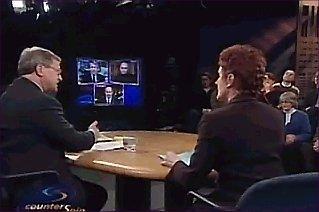 Canada/U.S.
relations, the
role
of religion in the justice system, and the
future of public health care. His research into all these issues
brought him a renewed awareness of international geopolitical trends
in the wake of September 11, considerably sharpening his critical journalistic
skills in dealing with subsequent developments. Canada/U.S.
relations, the
role
of religion in the justice system, and the
future of public health care. His research into all these issues
brought him a renewed awareness of international geopolitical trends
in the wake of September 11, considerably sharpening his critical journalistic
skills in dealing with subsequent developments.
In spite of over 2,000 viewers
signing an online petition to keep the show on the air, counterSpin aired its final
broadcast May 12, 2004, following a highly successful 6-year run
on CBC Newsworld, the CBC's then all-news cable channel (now renamed CBC News Network), and was also broadcast across the U.S. on Free
Speech TV, and hence available in over 11 million American homes on the DISH
Network, and on 88 community access cable stations in 23 states.
He has always supported (truly) independent media,  and is very interested in projects like Witness, that work to strengthen grassroots advocacy by making video and technology tools available to local organizations worldwide - spotlighted in and is very interested in projects like Witness, that work to strengthen grassroots advocacy by making video and technology tools available to local organizations worldwide - spotlighted in  the spell-binding documentary "Seeing is Believing", by Peter Wintonick and Katerina Cizek - and BigThink.com, whose creators hope to encourage online discussion of important issues by fostering an interactive video dialogue. the spell-binding documentary "Seeing is Believing", by Peter Wintonick and Katerina Cizek - and BigThink.com, whose creators hope to encourage online discussion of important issues by fostering an interactive video dialogue.
Colman has also worked in independent media himself, producing both radio programs for Toronto community radio stations CKLN-FM and the University of Toronto's CIUT-FM, and a 4-hour video documentary series for the MacLean-Hunter/ Rogers Cable 10 community channel, a volunteer effort that was honoured with both a Lizzie Award (Current Affairs Category), and another from the Ontario Cable Television Association (OCTA). Rogers Cable 10 community channel, a volunteer effort that was honoured with both a Lizzie Award (Current Affairs Category), and another from the Ontario Cable Television Association (OCTA).
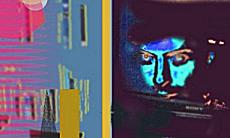 Colman's
interest in film and video also extends to more esthetic, artistic endeavours., and he is planning
on converting more of his earlier video art projects for viewing on
the web, and has also been conducting occasional experimental streaming
live video/audio transmissions over broadband connections. He closely
follows developments in streaming technology, and watches with interest
as the opportunities for decentralized broadcasting via the internet
slowly begin to eclipse the existing corporate-controlled radio and
TV infrastructure. Colman's
interest in film and video also extends to more esthetic, artistic endeavours., and he is planning
on converting more of his earlier video art projects for viewing on
the web, and has also been conducting occasional experimental streaming
live video/audio transmissions over broadband connections. He closely
follows developments in streaming technology, and watches with interest
as the opportunities for decentralized broadcasting via the internet
slowly begin to eclipse the existing corporate-controlled radio and
TV infrastructure.
Music � Words � Radio � Video
E-mail:
webmail@colman.net
Home
Last
updated January 1, 2023
Copyright © 2023 by Colman Jones. All rights reserved.
|
 Although Colman's
main accomplishments have been in radio and print journalism, he also worked extensively at various television news and current affairs
programs at the CBC, most recently serving as an associate producer for the network's World News desk. Prior to that was a 3-year stint at CBC's flagship TV newscast
Although Colman's
main accomplishments have been in radio and print journalism, he also worked extensively at various television news and current affairs
programs at the CBC, most recently serving as an associate producer for the network's World News desk. Prior to that was a 3-year stint at CBC's flagship TV newscast 






 a humorous review of
a humorous review of 




 Colman
has been working with visual media, in one form or another, ever since
he started playing around with the family Super 8 camera at the age
of 12, editing together home movies with using a simple film splicer,
and creating soundtracks with music, sound effects and voice-overs.
This later developed into an interest in home video, with Colman acquiring
production equipment for both artistic dabblings and professional work.
Working out of a small production company, he offered video recording
services for various live events, as well as transfers from film to
video, producing industry presentations for corporate clients including
Avanti Computers, Dominick Hunter, Cyrus K. Clothing,
and the School of Chinadance.
Colman
has been working with visual media, in one form or another, ever since
he started playing around with the family Super 8 camera at the age
of 12, editing together home movies with using a simple film splicer,
and creating soundtracks with music, sound effects and voice-overs.
This later developed into an interest in home video, with Colman acquiring
production equipment for both artistic dabblings and professional work.
Working out of a small production company, he offered video recording
services for various live events, as well as transfers from film to
video, producing industry presentations for corporate clients including
Avanti Computers, Dominick Hunter, Cyrus K. Clothing,
and the School of Chinadance.  Colman
has also learned many valuable technical skills freelancing as a film
projectionist at a number of different houses in Toronto during the
1990s. These included
Colman
has also learned many valuable technical skills freelancing as a film
projectionist at a number of different houses in Toronto during the
1990s. These included 


 After working for a number years as a freelance writer, radio broadcaster, and projectionist Colman eventually returned to mainstream television, joining CBC-TV's flagship
investigative consumer affairs program
After working for a number years as a freelance writer, radio broadcaster, and projectionist Colman eventually returned to mainstream television, joining CBC-TV's flagship
investigative consumer affairs program 




 Colman's
interest in film and video also extends to more esthetic, artistic endeavours., and he is planning
on converting more of his earlier video art projects for viewing on
the web, and has also been conducting occasional experimental streaming
live video/audio transmissions over broadband connections. He closely
follows developments in streaming technology, and watches with interest
as the opportunities for decentralized broadcasting via the internet
slowly begin to eclipse the existing corporate-controlled radio and
TV infrastructure.
Colman's
interest in film and video also extends to more esthetic, artistic endeavours., and he is planning
on converting more of his earlier video art projects for viewing on
the web, and has also been conducting occasional experimental streaming
live video/audio transmissions over broadband connections. He closely
follows developments in streaming technology, and watches with interest
as the opportunities for decentralized broadcasting via the internet
slowly begin to eclipse the existing corporate-controlled radio and
TV infrastructure.